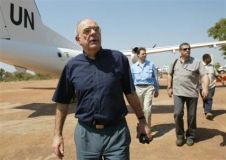UN warns Sudanese govt, rebels on ceasefire violations
ABUJA, Oct 24 (AFP) — The United Nations sent a tough message to delegates at peace talks on the civil war in Sudan’s western province of Darfur, warning them that the international community would not tolerate mounting ceasefire violations and attacks on civilians.
 On the eve of the first formal negotiations of the African Union’s second Darfur peace conference in Abuja, UN special representative Jan Pronk acknowledged that the political and humanitarian situation in the war torn region had improved since the talks process began.
On the eve of the first formal negotiations of the African Union’s second Darfur peace conference in Abuja, UN special representative Jan Pronk acknowledged that the political and humanitarian situation in the war torn region had improved since the talks process began.
But he warned that attacks on aid workers and civilians were continuing and called on both the Sudanese government and Darfur’s two rebel movements to implement their promises to stabilise the security situation and to guarantee the safety of 1.5 million displaced people.
And, in a signal of the importance the international community attaches to the crisis, he announced that the United Nations Security Council, which has in the past threatened to impose sanctions on Khartoum’s key oil industry, would hold a special meeting in the Kenyan capital Nairobi next month.
“The situation is tense. The security situation on the ground is quite difficult because there are breaches of the ceasefire on both sides,” said Pronk, who is UN Secretary General Kofi Annan’s representative in Sudan.
“I held a meeting with the ceasefire commission last week in Egypt… They said there is an increasing number of ceasefire violations on both sides and that is not helpful,” he told reporters after meeting conference delegates to brief them on the situation in Darfur.
“The Security Council has decided to have a meeting in Nairobi on 18, 19 and 20 November. This is the second time in the 50-year history of the Security Council that it is meeting outside New York in Africa in order to highlight the importance the Security Council is giving African problems,” he said.
The United Nations estimates that 1.5 million people have been driven from their homes during the conflict and that 70,000 civilians have been killed since two rebel movements launched an uprising in the province of Darfur.
The insurgents alleged that Darfur’s black African tribes have been politically marginalised by the Arab-led regime in Khartoum and have demanded more autonomy and a greater share of Sudan’s oil wealth for their region.
Khartoum responded by unleashing a brutal Arab militia to attack civilian communities suspected of supporting the rebellion, triggering what the United Nations has described as the “world’s worst humanitarian disaster”.
African leaders are determined that the Abuja talks will produce enough progress to convince the international community that their continent is at last ready and able to resolve its own problems.
In Abuja, AU mediators hope that both sides will rapidly agree to sign a “humanitarian protocol” which was drawn up last month during the first period of discussions.
Both the government and the rebels say they support the wording of the document — which would commit both parties to allow unfettered access to aid convoys and to guarantee the security of refugee camps — and Khartoum has said it will implement the plan unilaterally if the rebels refuse to sign.
But the rebel side — represented by leaders of the Justice and Equality Movemement (JEM) and Sudan Liberation Movement (SLM) — indicated that their signature is tied to the progress of a second and more controversial “security protocol”, a stance which could hold up the talks.
“The issue of implementing the humanitarian protocol unilaterally is not going to work,” JEM leader Mohammed Tugod told AFP.
“We are willing to sign the two protocols together, as we stated right from the beginning of the talks. We are still in the same position. But hopefully in the coming two days, we will sort this out,” he added.
Pronk said that persuading the warring parties’ to make good their promises on the ground was be more important than getting signatures on the documents. He complained that militia groups were attacking humanitarian workers and looting aid shipments.
“This is sending a negative signal to humanitarian agencies. Aid agencies get afraid to come in because they are being attacked,” he warned.
“Don’t say that ‘one party is not complying and so we will not comply’, because the United Nations will deal with any erring party,” he told delegates, warning them that two recent Security Council resolutions on the crisis were “shared obligations” and could be enforced.
